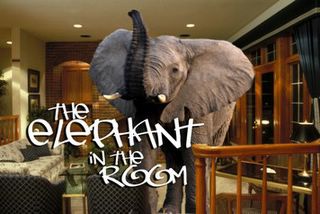“To make a start where we are,
we must recognize that our world is not normal,
but only usual at present.”
Dallas Willard[i]
we must recognize that our world is not normal,
but only usual at present.”
Dallas Willard[i]
A man who visited a community of people who lived by a river. As evening approached, the man was invited to sit down by the river and enjoy a cool beverage and then dinner with the people. While they ate calmly and pleasantly, a 14-foot crocodile suddenly came up out of the river, chomped off the arm of the man sitting closest to the riverbank and then slipped silently back into the dark waters. The people were alarmed and shocked, but they recomposed themselves.
Those closest to the man bandaged him up the best they could and transported him to medical assistance. Then they resumed their eating, drinking and conversation — picking up right where they left off without any discussion of the incident.
The visiting man was horrified that the evening continued as if nothing had happened. Each time he tried to mention the tragic and violent act, someone in the group quickly changed the subject. He made one final attempt to bring up the incident. "A man just lost his arm to an enormous crocodile that came suddenly out of the river. Didn’t you all see that, or was I imagining things?" Someone in the group replied, "Yes, I saw what happened. A number of people are attacked by crocodiles each year in our community."
The man then looked closer at the group and, sure enough, he spotted people who were missing hands and feet, fingers and ears. "Can’t you do anything about the crocodiles?" he asked.
Another in the group replied with embarrassment clearly written on his face, "It is impolite in our culture to talk about crocodiles."[ii]
There is another phrase similar to this story that communicates the same message. It’s the elephant in the room idiom. There are several variations of this phrase: elephant in the living room, elephant in the corner, elephant on the dinner table. It is an English idiom for some issue that is extremely obvious to a group of people, but which is very carefully not being discussed. It derives its symbolic meaning from the fact that an elephant would indeed be conspicuous and remarkable in a small room; thus the idiom also implies a value judgment that the issue should be discussed openly.[iii] The idiom is commonly used in addiction recovery terminology to describe the reluctance of friends and family of an addicted person to discuss the person's problem, thus aiding the person in their denial. The idiom is also occasionally invoked as pink elephant in the corner, perhaps for no other reason than a pink elephant stands out better than a normal one.
Everyone sees it, yet no one says anything about it. Everyone is all too aware of it and seemingly with ease side step right around it. The elephant may resemble an alcoholic father, an abusive situation, a way of communicating or not communicating. Out of no where, dad blows up on one of the kids and the wife looks out the window as if nothing happened. A spouse and parent, get up and go to work, only to come home grab a plate of food, and plop down in front of the television until they drag themselves to bed, only to fall asleep and repeat the drama over again tomorrow. An unhealthy pattern, not doubt – an elephant – but no one’s talking about it. For some it’s not the explosions, but the implosions. Nothing is said, no feelings are shared, silence is the mode of operettas. The examples are countless.
Looking back on family upbringings, each of us can probably at least identify one elephant, many of us can easily spot a whole herd. We can become so accustomed to side stepping around the elephant that we become immune to its abnormality.
Elephants can exists with a person, a couple, a family, a community, even a church. Churches are famous for having sacred elephants. This family doesn’t talk to that family. This person(s) doesn’t like that person’s kids, but enjoy the company of each other. They both are aware of the tension. So all of their conversations become filtered, much is discussed, many laughs are exchanged, but always careful not to bring up particular subjects that would get too close to the elephant (the other’s kids). Friends, perhaps, but not free. It’s a sad reality when you can’t rejoice over what’s closest to your heart with those you call your closest friends. There are many more…
Honest Conversations
q Looking back, what elephants alive and well in your family growing up?
q Are there any elephants that are herding in your family and relationships now?
q Have you sighted any sacred elephants at church?
Hunting Season for Sacred Elephants
Season’s Now Open
No Limit on Number eradicated
[i] Dallas Willard, The Renovation of the Heart, Colorado Springs: NavPress, 2002, 189.
[ii] As told by Tommy Nelson, Song of Solomon Series.
[iii] Wikipedia encyclopedia, http://en.wikipedia.org/wiki/Elephant_in_the_room.


No comments:
Post a Comment